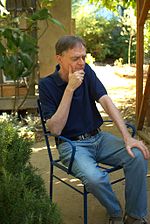Richard Heinberg
Richard Heinberg | |
|---|---|
 Heinberg discussing energy at University of Toronto, March 2013 | |
| Occupation | Writer, educator, environmentalist |
| Genre | non-fiction |
| Subject | peak oil, resource depletion, sustainability |
| Notable works | The Party's Over: Oil, War, and the Fate of Industrial Societies
|
| Spouse | Janet Barocco |
| Website | |
| richardheinberg | |
Richard William Heinberg is an American journalist and educator who has written extensively on energy,
Early life
Heinberg grew up in St. Joseph, Missouri. His father, William Heinberg, was a chemist and high-school physics and chemistry teacher. Heinberg's interest in science came from his father, but at an early age, he rejected his parents' fundamentalist Christian beliefs. At one point he lived at Colorado's Sunrise Ranch, headquarters of the "Emissaries of Divine Light" group, which Heinberg referred to as "a sort of benign cult".[2]
Career
After two years in college and a period of personal study, in November 1979 Heinberg became
In June 1995, speaking to the International Society for the Comparative Study of Civilizations in Dayton, Ohio, Heinberg provided "A Primitivist Critique of Civilization" and discussed the ways in which "we are, it would seem, killing the planet".[8]

In February 2007, Heinberg addressed the
Heinberg is now the
Heinberg has proposed an international protocol to peak oil management with the aim of reducing the impact of the arrival of the peak.
Heinberg is the editor of MuseLetter,
Heinberg serves on the advisory board of The Climate Mobilization, a grassroots advocacy group calling for a national economic mobilization against climate change on the scale of the home front during World War II, with the goal of 100% clean energy and net zero greenhouse gas emissions by 2025.[16]
Heinberg is one of the more moderate commentators on peak oil (compared with others like James Howard Kunstler[17]).
Books
Heinberg's books from the later 1990s address the relationships between humanity and the natural world. In 1998, he began teaching at New College of California[18] in the "Culture, Ecology and Sustainable Community" program, which he helped design. He remained a member of the Core Faculty until 2007, when the College closed its doors. His book The Party's Over: Oil, War, and the Fate of Industrial Societies, published in 2003, was one of the first full-length analyses of peak oil.
In 2004, Heinberg provided the closing address for the First US Conference on Peak Oil and Community Solutions. His title was "Beyond the Peak".
Publications
- Memories and Visions of Paradise: Exploring the Universal Myth of a Lost Golden Age (1989; revised edition, 1995; British edition, 1990; Portuguese edition, 1991)
- Celebrate the Solstice: Honoring the Earth’s Seasonal Rhythms through Festival and Ceremony (1993; Italian edition, 2002; Portuguese edition, 2002)
- A New Covenant with Nature: Notes on the End of Civilization and the Renewal of Culture (1996; Portuguese edition, 1998) ISBN 978-0-8356-0746-9
- Cloning the Buddha: The Moral Impact of Biotechnology (1999; Indian edition, 2001; Japanese edition, 2001; Chinese edition, 2001)
- The Party's Over: Oil, War, and the Fate of Industrial Societies (2003; British, Italian, German, Spanish, and Arabic editions, 2004–2005; revised North American edition, 2005; Spanish edition, 2007; French edition, 2008 German Edition)
- ISBN 9780865715103) (2004; British edition 2005)
- The Oil Depletion Protocol: A Plan to Avert Oil Wars, Terrorism and Economic Collapse (2006, ISBN 978-0-86571-563-9),
- Peak Everything: Waking Up to the Century of Declines (2007, ISBN 978-0-86571-598-1).
- Blackout: Coal, Climate, and the Last Energy Crisis (June, 2009). (ISBN 9780865716568)
- The Post Carbon Reader: Managing the 21st Century’s Sustainability Crises, edited by Richard Heinberg & Daniel Lerch (2010) ISBN 978-0-9709500-6-2
- The End of Growth: Adapting to Our New Economic Reality, (2011) ISBN 978-0-86571-695-7
- Snake Oil: How Fracking's False Promise of Plenty Imperils Our Future (2013) ISBN 978-0976751090
- Afterburn: Society Beyond Fossil Fuels (2015) ISBN 978-0865717886
- Our Renewable Future: Laying the Path for One Hundred Percent Clean Energy (2016) ISBN 978-1610917797, co-authored by Richard Heinberg and David Fridley
- Power: Limits and Prospects for Human Survival (2021) ISBN 978-0865719675
See also
- Energy descent
- Oil depletion
- Peak oil
- Petrodollar warfare
References
- ^ "Our Fellows". Post Carbon Institute. Retrieved 2021-07-04.
- ^ Arnie, Cooper (July 2006). "The Age Of Oil Is Coming To An End – An Interview With Richard Heinberg" (PDF). The Sun. Archived from the original (PDF) on May 23, 2007. Retrieved August 9, 2017.
- KronosVI(2), Winter 1981.
- ^ Sammer, Jan. The Velikovsky Archive. Aeon VI(2), Dec. 2001.
- ISBN 0-87477-515-9.
- ISBN 978-0-8356-0716-2.
- ISBN 0-8356-0693-7.
- ^ Heinberg, Richard (June 15, 1995). "The Primitivist Critique of Civilization". A paper presented at the 24th annual meeting of the International Society for the Comparative Study of Civilizations at Wright State University, Dayton, Ohio. Retrieved June 9, 2012.
- ^ "Peak oil educator to visit New Zealand" (Press release). Green Party. 4 October 2007. Retrieved 9 June 2012.
- ^ Fitzsimons, Jeanette (11 October 2007). "Questions for Oral Answer — Questions to Ministers, Questions to Members". New Zealand Parliament. Retrieved June 9, 2012.
- ^ "Oil Independent Oakland (OIO) By 2020 Task Force". 2008. Archived from the original on 2013-05-25. Retrieved 9 September 2013.
- ^ "#182: The Oil Depletion Protocol: An Update". wordpress.com. 2 June 2007. Retrieved 9 August 2017.
- ^ Protocol of Uppsala
- ^ "Richard Heinberg's Museletter". Richard Heinberg's Museletter. Retrieved 9 August 2017.
- ISBN 978-1-55092-337-7.
- ^ "Advisory Board". The Climate Mobilization. Retrieved 30 August 2016.
- ^ "Clusterfuck Nation – Blog Archives - Kunstler". Kunstler. Retrieved 9 August 2017.
- ISBN 978-1-61069-147-5.
External links
- Official website
- Richard Heinberg at IMDb
- 2008 interview on Global Public Media Heinberg on Post Carbon Institute's Green New Deal
- Peak Everything lecture on YouTube
- The End of Growth: 2011 interview with Heinberg on YouTube on the Keiser Report

